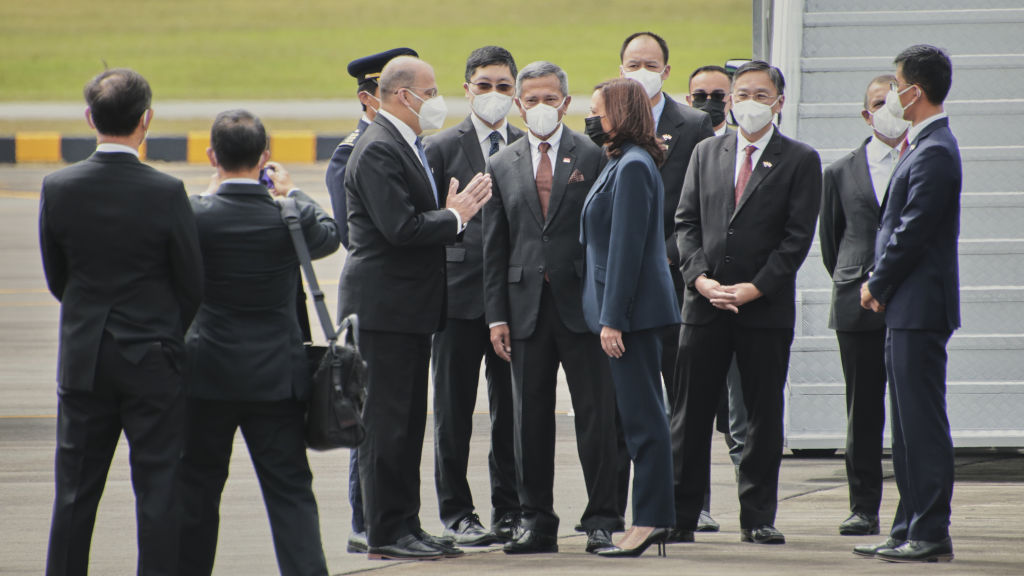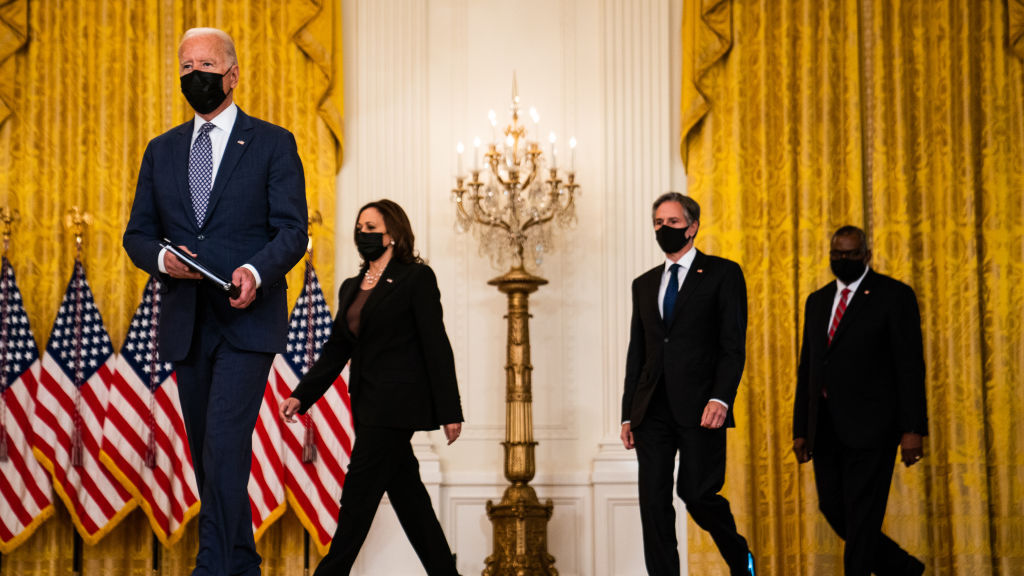
U.S. Vice President Kamala Harris (center right) is greeted by Singapore's foreign affairs minister Vivian Balakrishnan (center) and other dignitaries after disembarking from Air Force Two at Paya Lebar Air Base in Singapore, August 22, 2021. /Getty
U.S. Vice President Kamala Harris (center right) is greeted by Singapore's foreign affairs minister Vivian Balakrishnan (center) and other dignitaries after disembarking from Air Force Two at Paya Lebar Air Base in Singapore, August 22, 2021. /Getty
Editor's note: Adriel Kasonta is a London-based foreign affairs analyst and commentator. He is the founder of AK Consultancy and former chairman of the International Affairs Committee at Bow Group, the oldest conservative think tank in the UK. The article reflects the author's opinions and not necessarily the views of CGTN.
Since the Obama presidency, the U.S. has been attempting to redirect its foreign policy focus from the Middle East to the Asia-Pacific. While Barack Obama called it a "pivot," Donald Trump was pushing the idea of a "free and open Indo-Pacific."
Both had in common the aim to challenge China's "growing influence" in the world. Although neither of them succeeded in going beyond mere concept, the new administration of Joe Biden makes yet another attempt to reverse the U.S. empire's decline and give it a new purpose amidst its economic hardships.
The recent seven-day trip of U.S. Vice President Kamala Harris to Singapore and Vietnam is the best example of the Biden administration's resolve to re-declare Washington's commitment to Southeast Asia after Trump's withdrawal from the Trans-Pacific Partnership five years ago and reinforce the U.S. vision for the region, while the prime goal is to limit Beijing's influence in its own neighborhood.
However, the White House and the Western press have tried to do their best to skillfully camouflage the real purpose of Harris's "tour de Asia" by emphasizing her "charm offensive," which also introduced an important initiative to tackle the ongoing COVID-19 crisis, the next pandemic prevention, the global climate emergency, smart cities and green building standards promotion throughout the Association of Southeast Asian Nations (ASEAN).
In this sense, the U.S.-Singapore Climate Partnership, which aims to develop new climate standards and collaborate on projects to expand clean energy infrastructure and development, and the U.S. Centers for Disease Control and Prevention Southeast Asia Regional Office in Hanoi – one of four regional CDC offices globally – focused on collaborating with regional governments on research and training to deal with and prevent global health crises – were launched.
In addition, the U.S. promised $23 million to help Vietnam, where less than 2 percent of its population of 98 million people has been vaccinated so far. It ramped up its vaccine diplomacy efforts by offering 1 million additional doses of the Pfizer vaccine and delivering 77 freezers to store them.
On the other hand, Singaporean Prime Minister Lee Hsien Loong and U.S. VP Kamala Harris welcomed the expansion of bilateral cooperation on cybersecurity with the conclusion of three MOUs between the Cyber Security Agency of Singapore (CSA), the Monetary Authority of Singapore (MAS), and the Singapore Ministry of Defense (MINDEF), and respective US agencies.
The idea of a digital trade pact among several nations in the region, which could cover digital security and agreed on standards in emerging technologies like AI and blockchain, was also pushed in the country and is said to be a move aimed at countering China's "digital silk road." Unfortunately, despite claiming that the U.S. "engagement in Southeast Asia and the Indo-Pacific is not against any one country, nor is it designed to make anyone choose between countries," Kamala Harris accused Beijing, in the very same speech delivered in Gardens by the Bay, of "coercion and intimidation," while on her visit to Vietnam called the country to back Washington against China's maritime claims in the South China Sea.

U.S. President Joe Biden, followed by Vice President Kamala Harris, Secretary of State Antony Blinken and Secretary of Defense Lloyd Austin, enter the room to deliver remarks regarding the evacuation of Afghanistan in the East Room at the White House, August 20, 2021. /Getty
U.S. President Joe Biden, followed by Vice President Kamala Harris, Secretary of State Antony Blinken and Secretary of Defense Lloyd Austin, enter the room to deliver remarks regarding the evacuation of Afghanistan in the East Room at the White House, August 20, 2021. /Getty
On top of that, during her meeting with Vietnamese Prime Minister Nguyen Xuan Phuc, Harris also expressed support for sending an additional U.S. Coast Guard cutter to Vietnam to help defend its security interests in the region and embraced elevating the relationship with Vietnam from a comprehensive partnership to a strategic partnership.
As it is clear and perfectly understandable, none of the countries in Southeast Asia want to pick sides, as they are perfectly aware that this threatens the security and development of the region. Moreover, Asia Pacific states are increasingly locked into tight trade relationships with Beijing through the Regional Comprehensive Economic Partnership, signed in November last year. It would be foolish to harm their trade relations with their neighbor and the prime economic engine of the region's success.
In spite of this knowledge, experiencing a cognitive dissonance after hosting Kamala Harris on their land, Singapore and Vietnam have been put in an awkward situation, amid the messy end to the inglorious war in Afghanistan, which resembles equally humiliating withdrawal of the U.S. troops from Saigon in 1975 – a comparison confirmed by the U.S. Senator Bill Hagerty, a Tennessee Republican and a former U.S. ambassador to Japan.
With the striking similarities between the "falls" of Saigon and Kabul, all the countries in the region would be well-advised to remember that 46 years ago, the U.S. pulled out from Vietnam, leaving the region divided and vulnerable, with a devastating conflict lasting for another 15 years in Cambodia, which ASEAN – founded in 1967 at the height of the Vietnam War – worked hard to put to an end.
As Spanish philosopher George Santayana said, "Those who cannot remember the past are condemned to repeat it," so those who cannot read the present correctly are most probably doomed to share the same fate as the region, which the U.S. also tried to use to advance its self-serving economic and strategic interests and abandoned it without any hesitation once it became no longer profitable to stay there, leaving chaos, death, devastation and misery behind.
(If you want to contribute and have specific expertise, please contact us at opinions@cgtn.com.)

